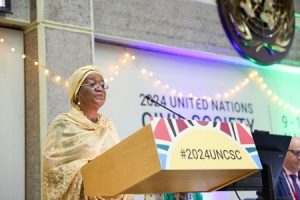The first-ever UN civil society conference held in Africa wrapped up in Nairobi on Friday (10 May)hearing calls for “bold and honest” conversations among governments and civil society to drive forward a shared vision for reinvigorated multilateralism, a better world, and a brighter future for all.
At the closing session of the 2024 United Nations Civil Society Conference in the Kenyan capital, Secretary-General António Guterres and President William Ruto praised the efforts of civil society and underscored their “indispensable contributions.”
In his address, Mr. Guterres said time and again he had witnessed the enormous impact of civil society in every corner of the world; easing suffering, pushing for peace and justice, standing for truth, and advancing gender equality and sustainable development, with many working at great personal risk.
Guterres went on to stress that the involvement of civil society was crucial to tackling the many problems being faced by the world today, including when responding to crisis, closing the digital divides, and revitalizing the collective approach to peace and security.
“We need to be informed by your frontline know-how; We need your can-do attitude to overcome obstacles and find innovative solutions,” explained the UN chief, adding: “We need you to use your networks, knowledge and contacts to implement solutions, and to persuade governments to act. Your contributions have been indispensable, and I thank you.”
The Secretary-General invited civil society to bring their spirit to the so called ‘Action Days’ being held in connection with this September’s highly anticipated UN Summit of the Future and asked them to engage their governments to demand ambitious commitments at that event.
“Keep working with us to build a better world,” he concluded.
For his part, Kenyan President William Ruto outlined his government’s commitment in recognition of the civil society sector, noting that yesterday, it had moved to bring the Public Benefits Organization Act into law in the country.

The Act now consolidated the operations of civil society into one predictable legal regime, making it easier for civil society, including those from outside of Kenya, to operate.
“We are determined to reinvigorate our development agenda by harnessing the organizing and advocacy power of civil society,” he said, but stressed that it was evident that significant work lay ahead.
There is no room to lock others outside: “Kenya remains steadfast in its commitment to a strong partnership with an empowered civil society, to advance our pursuit of a sustainable, just and inclusive future.”
Over the past two days, the 2024 Civil Society Conference, held at the UN Office at Nairobi (UNON), featured a host of briefings, interactive dialogues, and some 37 workshops, and 20 ImPACT coalitions.
The Conference took place ahead of the Summit of the Future, which will bring delegations from all over the globe to UN Headquarters in New York this September to agree a roadmap of bold multilateral actions aimed at ensuring a fairer, safer and more sustainable world now and for generations to come.
Conference Co-Chair Nudhara Yusuf said that over the past two days, civil society had made a “big statement” of what they expected from intergovernmental processes and what they could offer. If the Summit of the Future expected UN Member States to be ambitious, civil society must be willing to do the same.
For her part, Co-Chair Carole Ageng’o said that at the close of the Conference, she was highly optimistic among others, considering the new partnerships that had been formed which opened space for all stakeholders to engage towards creating a more inclusive, sustainable and safe future for all.
Melissa Fleming, Under-Secretary-General of Global Communications, who’s Department had organized the Conference, underlined that civil society ideas and voices had always been crucial for the world of the United Nation’s: from the creation of the Sustainable Development Goals, to delivering impact and setting the stage for the Summit of the Future.
Solidarity was needed more today than ever before, said Ms. Flemming, and the Conference had set a powerful example in this regard.




